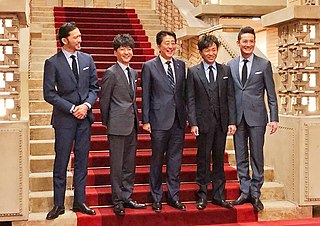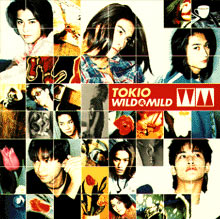J-pop, natively also known simply as pops, is a musical genre that entered the musical mainstream of Japan in the 1990s. Modern J-pop has its roots in traditional Japanese music, but significantly in 1960s pop and rock music, such as The Beatles and The Beach Boys, which led to Japanese rock bands such as Happy End fusing rock with Japanese music in the early 1970s. J-pop was further defined by new wave and crossover fusion acts of the late 1970s such as Yellow Magic Orchestra and Southern All Stars, then Eurobeat in the early 1990s, namely Namie Amuro.

Tokio is a Japanese rock/pop band formed by Johnny & Associates that debuted in 1994. It is made up of four men who were signed with Sony Music Entertainment from 1994 to 2001, with Universal Music Japan from 2001 to 2008, and are now signed under J Storm, a label owned by Johnny & Associates. In addition to their activities as a band, the members of Tokio also act in dozens of dramas and host variety programmes, both as a group and individually.
KinKi Kids are a Japanese duo consisting of Koichi Domoto and Tsuyoshi Domoto under the talent agency Johnny & Associates. Although the members share the same surname, the only relation they have to each other is that they both hail from the Kinki region, hence the duo's name. KinKi Kids hold the Guinness World Records for having the most number of consecutive No.1 singles since debut. With 28 million physical copies they are one of the best selling boy groups in Asian history.

Sugar is the eleventh studio album by Japanese band Tokio. It was released on February 20, 2008. The album peaked at sixth place on the Oricon weekly charts and charted for six weeks.

Act II is the ninth studio album by Japanese band Tokio. It was released on February 2, 2005. The album reached third place on the Oricon weekly chart and charted for seven weeks.
The discography of Tokio, a Japanese rock/pop band, consists of twelve studio albums, one cover album, one remix album, three compilation albums, one mini album, and more than fifty singles released under Sony Music Entertainment, Universal Music, and J-Storm.

TOK10 is a cover album by Japanese band Tokio, released on September 1, 2004. It was released to commemorate the tenth anniversary of the band's debut. The album peaked at first place on the Oricon weekly chart and charted for twelve weeks. Thus far, it is their only album to top the Oricon charts.

Glider is the eighth studio album by Japanese band Tokio. It was released on February 19, 2003. The album reached fifth place on the Oricon weekly chart and charted for six weeks.

5 Ahead is the seventh studio album by Japanese band Tokio. It was released on December 5, 2001. It was the first album to be released under Universal Music Japan. The album reached eighth place on the Oricon weekly chart and charted for six weeks.

Graffiti is the fifth studio album by Japanese band Tokio. It was released on April 1, 1998. The album reached ninth place on the Oricon weekly chart and charted for three weeks.

Best EP Selection of Tokio II is the second compilation album by Japanese band Tokio. It was released on May 9, 2001. It is the band's second of three compilation albums, with the first being, Best E.P Selection of Tokio. It reached sixth place on the Oricon weekly chart and charted for nine weeks.

Wild & Mild is the fourth studio album by Japanese band Tokio. It was released on March 26, 1997. The album reached ninth place on the Oricon weekly chart and charted for four weeks.

Best E.P Selection of Tokio is the first compilation album by Japanese band Tokio. It was released on March 26, 1997. The album reached fourth place on the Oricon weekly chart and charted for five weeks.

Blowing is the third studio album by Japanese band Tokio. It was released on March 25, 1996. The album reached seventh place on the Oricon weekly chart and charted for six weeks.

Bad Boys Bound is the second studio album by Japanese band Tokio. It was released on July 3, 1995. The album reached fourth place on the Oricon weekly chart and charted for four weeks.

Tokio is the debut eponymous album by Japanese band Tokio. It was released on November 21, 1994. It reached eighth place on the Oricon weekly chart and charted for thirteen weeks.

Let Me Know is a song by Japanese electronic musician Towa Tei, featuring singer Chara on vocals. It was released as the fourth single from his album Last Century Modern on June 23, 1999, a month before the album's release. It debuted at #34 on the Japanese Oricon album charts, and charted for four weeks. It did substantially better on the J-Wave airplay charts, charting in the top 30 for eight weeks.

17 is the twelfth studio album by Japanese band Tokio. It was released on August 22, 2012. The album peaked at fifth place on the Oricon weekly charts, and remained in the charts for five weeks.

"Amagasa" is a song by Japanese band Tokio. It was one of the two A-sides that composed the band's 39th single, along with the song "Akireru Kurai Bokura wa Negaō". The single was released on September 3, 2008, and was their first release with J Storm. "Amagasa" was written by Japanese rock musician Ringo Sheena. In 2014, Sheena covered the two songs she wrote for the single, "Amagasa" and "Kachū no Otoko", for her album Gyakuyunyū: Kōwankyoku.

Clear Horizon – The Best of Basia is a greatest hits compilation album by Polish-born singer Basia, released in November 1998 by Sony Music Entertainment.

















